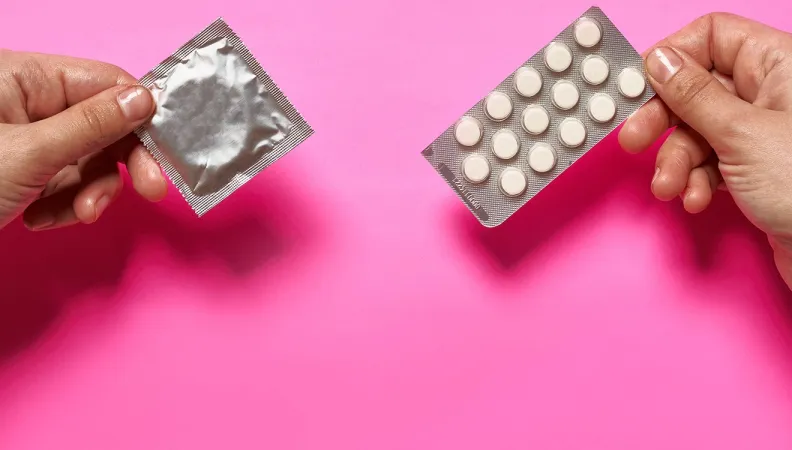Share the page
World Contraception Day: Supporting the Youth in Niger
Published on

Access to contraception is a major public health issue for women around the planet. To mark World Contraception Day on 26 September, AFD took a look at this issue through a major awareness-raising initiative led by the NGO Solthis in Niger.
The numbers speak volumes: at least 200 million women around the world do not have access to contraception. This leads to complications related to pregnancy, childbirth and unsafe abortions. The World Health Organization (WHO) estimates that 1.8 million unsafe abortions are performed every year. This is due to the lack of resources, freedom of choice and product availability, but also to the lack of information. Education in sexual and reproductive health is therefore a major public health issue, especially among young people.
Half of the country's Women are mothers at 18 years old
In Niger, 50% of women under 18 have at least one child. The Jades project (Healthy Children and Adolescents) implemented by the NGO Solthis and co-financed by AFD, aims to improve access to high-quality information on sexual and reproductive health.
“These are very sensitive issues because of religion and tradition, says Maiga Maimouna Almoctar, a senior reproductive health technician at the Boukoki National Youth Referral Center in Niamey. “Even if the government and its partners are making efforts for the sexual and reproductive health of young people and adolescents, it’s not always taken into account in certain communities.”
Young people get advice…from their peers
At the center, young people receive advice on issues they can’t talk about with their families. “There’s practically no dialogue between parents and their children” on sexuality, says Maiga Maimouna Almoctar. This is why access to reliable information and advice is essential, particularly between young people and their peers.
Since 2016, a consortium of NGOs has taken action to raise the awareness of young people. It is made up of Solthis, a specialist in prevention and access to healthcare, Lafia Matassa, a Nigerien health promotion organization, and Equipop, which is dedicated to women’s rights and health.
In this country where 70% of the population is under 25, Lafia Matassa and Solthis have developed a network of “men and women technicians” aged between 15 and 24. Their role is to raise awareness among their peers, of sexually transmitted infections, gender-based violence and contraception.
“Before the project, I didn’t really know very much about all this,” says Soureiya Siradji Moustapha, 20, an ambassador of the project in Niamey. “During the training, they showed us different methods such as implants, IUDs and condoms, as well as the pros and cons of each method, so that we can guide our peers.”
Further reading: Tunisia: Facilitating Access to Water and Women’s Empowerment
The young woman has been involved in activities for her classmates since she was 16 to ensure that reliable information is disseminated. “They were reluctant at the beginning,” she says. “Now they come to us. We do our utmost to show them that they can trust us, that we’re not their parents or their aunts. We work in pairs, a girl and a boy,” to facilitate the dialogue and accompany them if necessary on visits to health centers.
“There are many centers, but unfortunately the information doesn’t get across, so we have to fill this gap,” says Medji Habsatou, 22. An ambassador in Maradi, the young woman regrets the fact that the opening times are sometimes not suitable as “the centers are open at times when young people are in school.”
Picking up the pieces as services are disrupted
Moreover, since 2020, the Covid-19 health crisis has led to the closure of a number of sexual and reproductive health centers or a slowdown in their activities. Supply chains have also been weakened, causing shortages in contraceptives around the world.
Deprived of convivial places, the exchanges set up by the ambassadors in Niamey and Maradi now take place on WhatsApp. Young people get together on it for weekly meetings during which they can freely ask their questions and be referred to health centers.
Further reading: “Greater Inclusion of Women Develops Society as a Whole” - Mar Merita Blat
According to the United Nations Population Fund (UNFPA), the disruptions in family planning services caused by Covid-19 have affected some 12 million women around the world. According to UNFPA, these disruptions have caused 1.4 million unwanted pregnancies. Furthermore, the curfews imposed in many countries have increased men’s social control over their female partners, making it harder for them to access birth control.
“As a feminist institution, this has meant we’ve had to step up our international action for gender equality and to help women retain control of their own bodies,” says Mar Merita Blat, a gender expert at AFD. “So, AFD Group is proposing various projects with the aim of bringing about changes in terms of sexual and reproductive rights. They are illustrated in a brochure and good practice guide. These projects are in line with the commitments made by France at the Generation Equality Forum on sexual and reproductive rights and health.”
